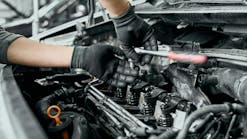Prioritizing training throughout the electrification of the aftermarket
The aftermarket is set to face one of the most significant changes we have ever seen in the industry. As electric vehicles (EV) become more popular, technicians will need to overhaul their skills and learn how to work on an entirely different technology. Preparation will be key to thriving in the changing landscape.
What does electrification mean for the aftermarket?
Car-buying habits and the aftermarket are inextricably linked. Often, when a new trend, brand, or make emerges, you expect to see more of those vehicles, and their parts, in your garage. But, the phase will pass, and as quickly as it left, another trend will come about. Think of the shift from CD to AUX to GPS and Bluetooth systems, or keys to keyless entry systems – there are constant innovations in ICE vehicles, but generally, the moving parts stay the same.
For auto technicians, the shift towards EVs is different. The introduction of highly complex EVs will require shops to completely change how they work, but combustion engine vehicles will continue to be a very large part of the active fleet for the next couple of decades, so the change won’t happen as soon as you might think.
EV adoption
Though governments, states, and cities, across the world, have pledged to end sales of petrol and diesel vehicles, adoption still varies globally. For example, in U.S, the government hasn’t committed; however, cities such as New York and Seattle have. Varied adoption often reflects the questions around the infrastructure EVs require.
Cities are predisposed to supporting EVs — with electricity available city-wide, it is possible to install charging points anywhere, and everywhere. However, in more rural areas, it’s trickier. The latest Census recorded around 19 percent of people living in rural areas, which means almost one-fifth of the population lives in a location where it could be difficult to install the necessary network of charging points. Long haul journeys across vast rural expanses won’t be possible for EV’s unless that infrastructure is in place.
As well as limitations to infrastructure potentially stalling adoption, standard warranties on EVs will also delay when auto repair shops begin to see an influx in EV requests. The standard warranty for an EV is typically eight years, and on some models, the battery warranty is eight years, so even as adoption gains momentum, there will still be a delay before EV’s are commonplace in independent automotive repair shops.
So, while change is coming, it won’t be overnight. In fact, I predict that by 2030 more than 90 percent of the cars on the road will still have ICE (including hybrids). We have time, so how can your shop take advantage of it?
Prioritizing training
Time doesn’t mean we should wait; it means we have a better chance at effective preparation. At the moment, second-hand car sales are booming, with difficulties in the supply chain and chip shortages persisting globally. More ageing vehicles on the road inevitably means more problems to fix, which opens up a huge opportunity for auto repair shops. So, take on as much as possible, and invest the profits in preparing for EVs with training and new equipment, so you’re ready to address the demand when it comes to you.
Training is a necessity. You cannot work on an EV without sufficient training. High-voltages make them exceptionally dangerous for untrained technicians, and one wrong move could result in a serious injury. The vehicle must first be made safe before technicians start work, even to carry out the simplest jobs.
Many auto repair shops are worried about the training requirements, with one-third expressing concern about keeping up with the latest technology in recent global research conducted by Delphi Technologies. But by saving and investing now, continued training will give technicians the confidence to work on the latest technology as it comes into the aftermarket.
Investing in equipment
Alongside training, shops will also require new equipment to work on EVs. The modern automotive repair shop uses multiple tools daily, and without them, they wouldn’t be able to repair all the vehicles they see every day. To offer the best service to the EV customer, auto technicians will require EV specific equipment too. Specialized connectors, high voltage tools, and fire equipment in case of emergency, will all be needed throughout the shop as well as many other new tools.
Along with updating equipment, auto repair shops will need to adapt to changing consumer expectations. Seamless online booking processes and apps to update customers when their car is ready for collection will become commonplace. Ensuring customers have an optimum experience will not only make businesses more successful today with the current vehicle fleet but also tomorrow with the new vehicle fleet.



